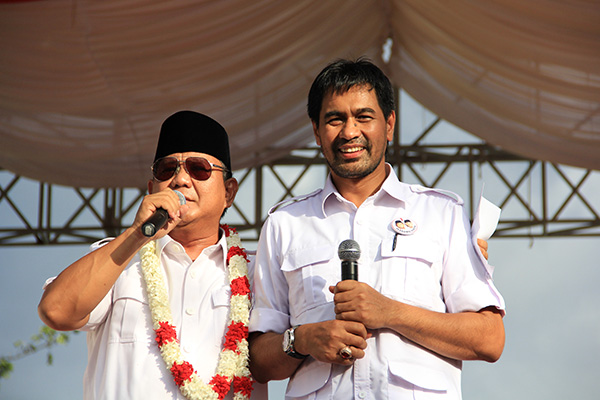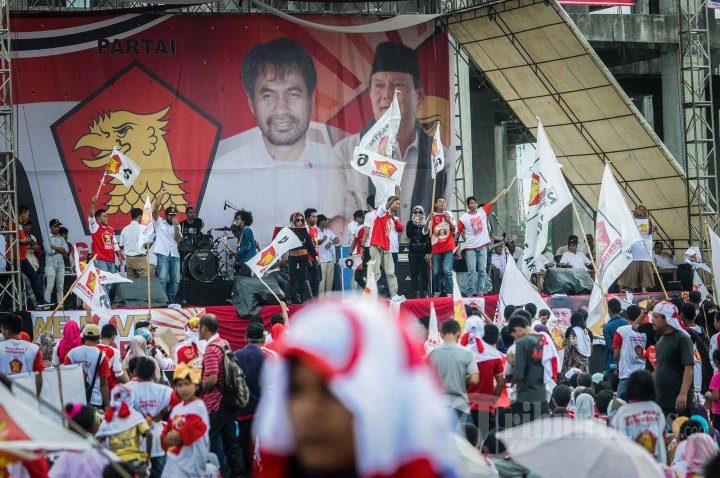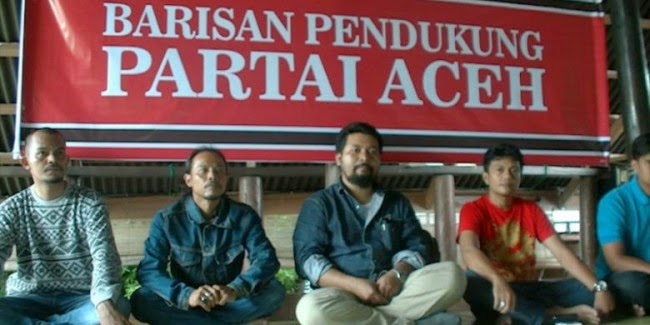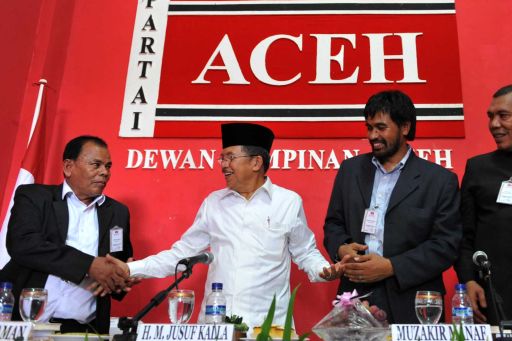
Prabowo and Deputy Chairman for Partai Aceh, Muzakir Manaf address a campaign rally in June 2014. Photo credit wartaaceh.com
In the Acehnese epic poem, the Hikayat Malém Dagang, the legendary Sultan Iskandar Muda confidently journeys across Aceh to raise an army before setting sail for battle on distant shores.
Along the way Iskandar Muda’s ship lost sight of Aceh’s coast. The epic recounts the moment of vulnerability, so rarely reported in saintly writing.
“Land had entirely disappeared from sight. / As they came to the midst of the sea, the land was entirely covered with black.
“Looking to sea one saw only the dark; looking for land one saw only a blank. / The country had disappeared; no one recognized the earth. / His majesty Meukoeta Alam [Iskandar Muda] felt frightened; the King was fearful and bathed in tears.”
Today’s ruling Aceh Party (PA) has always referred nostalgically back to Aceh’s pre-colonial sultanate for political inspiration, especially the imagined golden age of Iskandar Muda. Losing sight of land is an apt allegory for how PA performs its leadership at home and with Jakarta and for making sense of its recent discordance in endorsing a presidential candidate.
The most recent verses of PA’s contemporary hikayat begin with its political affair with The Great Indonesia Movement Party (Gerindra), which has finally come under more public scrutiny in the wake of April’s legislative elections. This alliance is both opportunistic and shocking given its parties were former adversaries in war.
Free Aceh Movement (GAM) ex-separatist elites in PA on the one hand, and Gerindra’s patron, the ex-Special Forces General Prabowo Subianto on the other. The relationship has its origins in Aceh’s gubernatorial campaign in 2011-2012, when a shared antipathy toward the incumbent Governor Irwandi Yusuf and mutually beneficial patron-client interests brought these strange bedfellows together.
In exchange for Prabowo bankrolling PA’s ticket for governor to defeat Irwandi in 2012, the local PA machine–unable to directly contest national-level office–would nominate viable ex-GAM candidates for Gerindra to contest seats for the national legislature and then actively campaign for Prabowo’s presidential bid.
Despite PA’s commando campaign strategy built upon intimidation and bribery, the limits of such an unlikely alliance began to reveal themselves in the legislative election results. Gerindra’s candidates won only two out of Aceh’s thirteen seats in the DPR-RI in Jakarta.
At the provincial level, PA’s base in Aceh’s assembly (DPRA) was significantly weakened, winning only 29 out of 81 seats (35.8 per cent) in the expanded DPRA, down from 33 out of 69 seats (47.8 per cent) in 2009. As reported in the Institute for Policy Analysis and Conflict’s (IPAC) legislative election report, the disappointing result clearly reflects voter dissatisfaction with PA’s clientelistic and ineffectual governance since coming to power five years ago.
In Banda Aceh this May, civil society activists I spoke to argued that despite PA’s reality check at the polls, the PA-Gerindra alliance would guarantee Prabowo’s victory in Aceh over Jokowi. A Jokowi win was inconceivable because not only would he have to overcome the intimidation and silencing effect of PA’s electoral machine, but also his affiliation to PDI-P and the general antipathy towards its matrona-non-grata Megawati Soekarnoputri – whose administration declared martial law and implemented devastating counter-insurgency operations in 2003-2004.
In mid-May, however, Jokowi chose former vice-president Jusuf Kalla (JK) as his running mate, who brokered peace for the province in 2005. As the IPAC report predicted JK’s nomination triggered a cascade of events in early June, that have created a new space for critical debate and political cover for Jokowi’s supporters in Aceh to make their case.
First, a widely rumored internal split between PA elites, particularly Governor Zaini Abdullah and Vice-Governor Muzakir Manaf, has found expression in their public endorsements for the two presidential candidates. Manaf was the last commander of GAM’s armed forces at the time of the peace agreement and heads the party. He orchestrated PA’s alliance with Gerindra and, has assumed leadership of Gerindra’s campaign team in Aceh.
But on 2 June, Zakaria Saman, GAM’s former Defense Minister and now a member of PA’s tuha peut (governing board), was formally named head of the Jokowi-JK campaign success team for Aceh. Two days later, Governor Abdullah, another tuha peut member, announced his long-rumored support for Jokowi-JK. In their press statements, both Abdullah and Saman cited JK as the reason behind their endorsement, but they stressed that they spoke as individuals and not PA party reps.
Both were careful to acknowledge Manaf’s individual right to endorse Prabowo. But not on behalf of the party, which would require a formal PA congress convened at the discretion of the tuha peut.
And so began several days of back and forth statements and rebuttals from within PA and among its supporters; Aceh’s leading newspaper Serambi launched a series of headline articles under the banner “PA Splits Apart in the Presidential Election.”
The second and more provocative event was a press conference at a popular Banda Aceh café on 4 June by a hitherto unheard of group calling itself the Barisan Pendukung Partai Aceh (BPPA), The Aceh Party Supporters Front. The head of BPPA, named Azmi, sat with four comrades in front of the BPPA banner, a close replica of PA’s flag. In Aceh, political critique tends to employ ambiguous language. Not this time.
Azmi demanded Manaf’s resignation as the Head of PA if he could not account for BPPA’s three accusations; entering PA into a coalition with Gerindra and endorsing Prabowo without going through established procedures; receiving a “dowry” of 50 billion rupiah from Gerindra for arranging the coalition; and purging other PA leaders for criticizing Manaf’s party leadership.
Before any of this appeared in the press, the news that Azmi had thrown down the gauntlet to the Vice-Governor circulated rapidly by text message and smartphone chat. I heard about it sitting with four activist friends. They had earned their activist credentials during Indonesia’s democratic transition when Aceh’s civil society crackled with activity and solidarity.
One friend asked with excitement“Is this our Azmi?” which naturally led me to ask, “Who is this Azmi?”, and they gamely dived into fond recollections of earlier activist days. Each contributed their admiring descriptions of a mysterious outsider figure.
“He lives in Jakarta. He left Aceh because his life was threatened during the conflict.”
“Azmi is Gayo [a minority ethnic group from the Aceh highlands].”
“Azmi is the guy who punched former [Aceh] governor Ibrahim Hasan in the face!”
“He is a big guy, wears a beard.”
“Azmi keeps a collection of peranakan Chinese antiques. His house in Jakarta is like a private museum.”
“He was a referendum activist like us, but he always operated behind the scenes of the movement, helping coordinate support in Jakarta.”
“Azmi owns a used bookstore in Jakarta, and recently opened up a branch in Kuala Lumpur.”
“Azmi keeps quiet; he only shows up at critical junctures.”
In the days after the press conference, Aceh’s newspapers served up a series of indignant outbursts from Manaf, who claimed that there is no BPPA, he’d never heard of Azmi, and he would pursue defamation charges. No report shed light on Azmi.
Eventually, local blogger, Taufik Al-Mubarak, lent detail to the mystery of Azmi, citing the details prior, but also that Azmi provided critical support to GAM during the conflict, knew Manaf and other GAM leaders, and had family connections to PA elites.
In today’s political climate of intimidation and censorship in Aceh, it says something that only a liminal insider-outsider figure such as Azmi, could speak openly without repercussion. Even as his accusations gained public traction, Aceh’s press busied themselves with the roaring refutations from Manaf rather than substantive inquiry into Azmi’s critique.
The day after BPPA’s statement, came a third event: JK’s visit to the province on 5 June. JK gave speeches in Banda Aceh and in the GAM heartland district of Pidie, emphasising the close historical ties between Aceh and his regional home in South Sulawesi (subtext: not Javanese), and emphasising his role in Aceh’s peace process and recovery from the tsunami.
NasDem head Surya Paloh joined him on the visit, his own party having won nine seats in the DPRA (tied with Golkar, and second only to PA). Several campaign consolidation events were held around the city to leverage momentum for the Jokowi-JK ticket and strategise voter mobilisation.
At one event in a cafe in Banda Aceh, for example, the notoriously corrupt ex-bupati of Bener Meriah district, Tagore Abubakar, formerly of Golkar but recently elected to the DPR-RI under PDI-P, tearfully begged forgiveness from the assembled Gayo students, activists, politicians, and donors for his past transgressions, then rallied them to unify behind the Jokowi-JK ticket for a better Gayo Highlands.
We should not underestimate Prabowo’s national momentum, nor the grip of PA’s electoral machine; but these events, all unfolding in the first weeks of June, have disrupted the foregone PA-Gerindra epic script of a landslide Prabowo win.
Aceh’s few million votes will not figure decisively in the national tally, but whether and how Aceh chooses the winning candidate will be critical for its leverage in Jakarta a decade after separatist conflict.
Bear in mind that Manaf enthusiastically embraced PA’s partnership with Gerindra when Prabowo was the clear front-runner for president; well before Jokowi entered the race, and long before PA and Gerindra performed below-target in April’s legislative elections.
PA wants to back a winner, so some observers speculate that the split among PA elites is by design. PA not only hedges their bets with either candidate; the party also forecloses opportunities for local opposition (such as Irwandi) to benefit from endorsing another winning candidate.
Whoever wins, PA can claim their endorsement secured Aceh’s good relations with Indonesia’s next president, but at the expense of revealing internal discord in the short term. This is how PA awkwardly negotiates an irreconcilable tension: to project sultanistic authority at home that nonetheless requires permission from a higher authority (Jakarta) to conduct transactional politics as usual.
For at least a brief political news cycle, Azmi’s strategic intervention lays bare the unseemly arrangement. As the news of his strident critique rippled through Aceh’s social networks, I saw one friend after another perk up in heated discussion and say, “ya, bagus dong!”, as if it was about time someone openly challenged and exposed PA’s delimited authoritarian impulse.
Jesse Hession Grayman is an assistant professor researching Aceh, Indonesia and Southeast Asia at Nanyang Technological University, Singapore.
 Facebook
Facebook  Twitter
Twitter  Soundcloud
Soundcloud  Youtube
Youtube  Rss
Rss 

